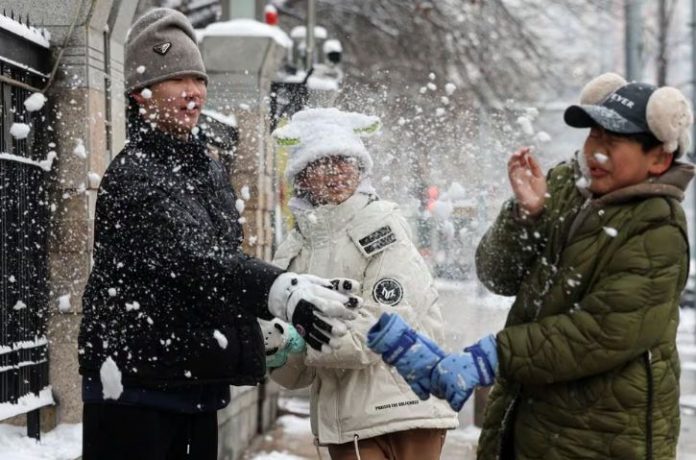BEIJING, Dec 13- Snow, blizzards and plunging temperatures swept northern China in what could be one of its most severe cold snaps in December, spurring authorities in the capital to halt train services, shut schools and tell people to stay home.
A mass of cold air drifted into Beijing from the west, the second cold wave this week. City officials have issued the second-highest alert for blizzards through Thursday, the only such warning yet in the country.
To avert chaos threatened by what was expected to be a “long-lasting” round of snowfall, the city of nearly 22 million shut all schools from Wednesday and moved classes online. Businesses were told to offer employees flexible working conditions and staggered commutes.
“We’ll try not to travel,” said a 36-year-old Beijing resident surnamed Liu, whose child’s school had closed as snow fell for the second time since Monday.
“It’s cold, and the roads are definitely bad.”
Scenic spots in the mountainous north and west have been temporarily shut.
Some railway services with key cities, such as the commercial hub of Shanghai, Hangzhou and Wuhan, were suspended. Trains that still ran went at slower speed, causing delays. But Beijing’s Capital Airport continued to operate.
Beijing could face temperatures as low as minus 18 degrees Celsius (minus 0.4 degrees Fahrenheit) this weekend, compared to the mid-December average of about minus 8 C (17.6 F).
Even Shanghai in the south, now experiencing balmy weather of 20 degrees Celsius (68 F), is forecast to be buffeted by weather as frigid as minus 4 C (24.8 F) on Saturday and Sunday.
More than 6,000 rescuers have been put on call for road emergency rescues and more than 5,800 sets of snow-removal equipment and machinery are on standby.
About 32,000 metric tons of snow-thawing agent has been readied for use on icy roads and motorways.
City officials canvassed volunteers to clear snow and shovel ice, in addition to 73,000 people on duty to tackle these tasks, and ordered indoor heating stepped up.
Beijing last experienced such cold weather on Jan. 7, 2021, when the temperature fell to minus 19.6 C (minus 3.28 F). The city’s all-time low of minus 27.4 C (minus 17.32 F), was recorded on Feb. 22, 1966.
This week’s cold snap, compared with the autumn-like conditions of a week ago, reflects recent sharp temperature swings. October was one of Beijing’s warmest in decades, in a year of weather extremes.
While northern China grappled with chillier-than-normal conditions, Hangzhou will officially begin winter only on Dec. 16, two weeks behind schedule and the latest since records began in 1951.
The city, near Shanghai, had to record five straight days of sub-10 C temperatures to declare the arrival of winter.
FROZEN RIVERS
Temperatures could drop more than 14 C, across swathes of northern, northwestern and southern China, along with parts of Inner Mongolia, Guizhou province and even regions south of the Yangtze River, weather officials have said.
Issuing its first alert since 2013 against freezing temperatures, the National Meteorological Centre (NMC) urged local governments to take precautions, along with measures to protect tropical crops and aquatic produce.
It has forecast wide rain and snowfall in central and eastern regions until Friday, with as much as 30 mm (1.2 inches) of precipitation in snowstorms in parts of Shaanxi, Henan and Shandong provinces.
The cumulative snowfall could be the highest in the corresponding period in a decade, it added.
Many rivers have already frozen over in the vast northeastern province of Heilongjiang bordering Russia.
Since Dec. 10, daily precipitation has exceeded December “extremes” at nearly 130 weather stations in provinces such as Shanxi, Henan, Shaanxi and Hebei, the NMC said.
































